Lindsay Townsend's Blog, page 24
July 18, 2011
Medieval jugglers and others
[image error]
In the Middle Ages, professional musicians and minstrels were highly thought of and ranked in royal and noble households as the equals to huntsmen and falconers. Dancers, too, were well regarded - in 1306, the only woman paid as a musician in the royal household was an acrobatic dancer (saltatrix, 'tumbler') with the 'stage name' of Matilda Makejoy. She possibly danced by bending backwards and touching her head with her feet, or on her hands, or on knives - in medieval stained glass Salome was shown dancing on knives.
Such dancers could be athletic and graceful or tumble in a jesting manner, playing for laughter. They could also be well paid and respected - Richard II paid John Katerine, a dancer from Venice, over £6 for playing and dancing before him, a sum not far short of £3,000 today.
[image error] Amongst the minstrels themselves there was a kind of ranking, with professional musicians at the top and jugglers and puppeteers at the bottom. Jugglers especially were considered at the time to be coarse, especially those who made a living wandering from fair to fair or village to village. Jugglers were felt to have few morals and to be able to do their tricks through magic - always a dangerous idea in the Middle Ages.
However jugglers were also held in affection, even by the church, and many illuminated manuscripts show jugglers. From the time of William the Conqueror, a 'King of the Jugglers' appeared at the court and would continue to appear through the Middle Ages. Whoever held this title had many rights to go with it. There is also a medieval legend of a juggler who, having nothing else to give, made an 'offering' of his juggling skills before a statue of the Virgin and Child in church. According to some variations of this story, the Madonna or Jesus caught one of the balls.
[image error] Juggling using different objects is more difficult than using the same objects. Bouncing objects off a floor is easier than tossing them in the air, and throwing all the objects in the air - called multiplexing in modern juggling - is easier than one after another.
Balls were commonly used for juggling but other things could also be used. In the Irish story of Cuchulainn, the hero juggles nine apples. The later Viking sagas also mention juggling and sometimes with weapons - Snorri Sturluson writes in one saga, "In the doorway of the hall, Gylfi saw a man juggling with knives, keeping seven in the air at a time.", a trick also mastered by Sunniva in A Knight's Captive.
[Illustrations from Wikimedia Commons.]

Such dancers could be athletic and graceful or tumble in a jesting manner, playing for laughter. They could also be well paid and respected - Richard II paid John Katerine, a dancer from Venice, over £6 for playing and dancing before him, a sum not far short of £3,000 today.
[image error] Amongst the minstrels themselves there was a kind of ranking, with professional musicians at the top and jugglers and puppeteers at the bottom. Jugglers especially were considered at the time to be coarse, especially those who made a living wandering from fair to fair or village to village. Jugglers were felt to have few morals and to be able to do their tricks through magic - always a dangerous idea in the Middle Ages.
However jugglers were also held in affection, even by the church, and many illuminated manuscripts show jugglers. From the time of William the Conqueror, a 'King of the Jugglers' appeared at the court and would continue to appear through the Middle Ages. Whoever held this title had many rights to go with it. There is also a medieval legend of a juggler who, having nothing else to give, made an 'offering' of his juggling skills before a statue of the Virgin and Child in church. According to some variations of this story, the Madonna or Jesus caught one of the balls.
[image error] Juggling using different objects is more difficult than using the same objects. Bouncing objects off a floor is easier than tossing them in the air, and throwing all the objects in the air - called multiplexing in modern juggling - is easier than one after another.
Balls were commonly used for juggling but other things could also be used. In the Irish story of Cuchulainn, the hero juggles nine apples. The later Viking sagas also mention juggling and sometimes with weapons - Snorri Sturluson writes in one saga, "In the doorway of the hall, Gylfi saw a man juggling with knives, keeping seven in the air at a time.", a trick also mastered by Sunniva in A Knight's Captive.
[Illustrations from Wikimedia Commons.]
Published on July 18, 2011 07:30
July 14, 2011
Five Red Roses for 'To Touch the Knight'
[image error]
A lovely review today for my latest!:
Ranulf is called the Black Knight for good reason. He defeats all challengers in the joust and he broods – on the death of his wife and his guilt. When he meets the Lady of the Lilies – a princess from far Cathay - he is intrigued and his mood lightens. The Princess always goes veiled and her clothes are exotic scraps of fine cloth, which she fashions in her own style. Who is she and why does she follow the tourney? Torn between the Princess and a little brown maid he saw peeping at him on the riverbank, Ranulf is determined to solve the mystery.
Edith and her people have run from a cruel master. In a land stalked by pestilence they have to find a way to survive both the Black Death and hunger, and they live in fear of discovery by their old lord. Only the Lady of the Lilies and her mystery stand between them and a terrible punishment. But perhaps now there is a new saviour in the person of the Black Knight. Can Ranulf keep them safe and lead them to a new life?
The time of the Black Death was terrible for people in England and Europe. Townsend treats this period with honesty and sympathy. Parts of the book are perhaps dark because of the period but there is also a great deal of humour, fun and sensuality in this book, which should delight Townsend's fans. I found it a thoroughly enjoyable read and the equal of her earlier knight books. This author is one to be followed as she carves a prominent place for herself on the historical list. If you enjoy medieval you must read this, because it is one of the best.
This book completely deserves its five red roses.
Linda Sole
http://redrosesforauthors.blogspot.com/2011/07/to-touch-knight.html

Ranulf is called the Black Knight for good reason. He defeats all challengers in the joust and he broods – on the death of his wife and his guilt. When he meets the Lady of the Lilies – a princess from far Cathay - he is intrigued and his mood lightens. The Princess always goes veiled and her clothes are exotic scraps of fine cloth, which she fashions in her own style. Who is she and why does she follow the tourney? Torn between the Princess and a little brown maid he saw peeping at him on the riverbank, Ranulf is determined to solve the mystery.
Edith and her people have run from a cruel master. In a land stalked by pestilence they have to find a way to survive both the Black Death and hunger, and they live in fear of discovery by their old lord. Only the Lady of the Lilies and her mystery stand between them and a terrible punishment. But perhaps now there is a new saviour in the person of the Black Knight. Can Ranulf keep them safe and lead them to a new life?
The time of the Black Death was terrible for people in England and Europe. Townsend treats this period with honesty and sympathy. Parts of the book are perhaps dark because of the period but there is also a great deal of humour, fun and sensuality in this book, which should delight Townsend's fans. I found it a thoroughly enjoyable read and the equal of her earlier knight books. This author is one to be followed as she carves a prominent place for herself on the historical list. If you enjoy medieval you must read this, because it is one of the best.
This book completely deserves its five red roses.
Linda Sole
http://redrosesforauthors.blogspot.com/2011/07/to-touch-knight.html
Published on July 14, 2011 03:14
July 10, 2011
Sample Sunday - a new excerpt from 'To Touch The Knight'
[image error]
Here, as part of Sample Sunday, is a new excerpt from To Touch The Knight. In it, Edith realizes she has been out-played for the moment in the courtly game by the fearsome - and attractive - knight, Ranulf.
Excerpt:
"Those are my lord's terms," said the squire. "A kiss for each favor.
The lanky young man stopped, scarlet in the face. Had Edith been less incensed she might have felt for him, but she had her own troubles.
"He will acknowledge me as his Master at this joust, and carry my favor?"
"As his Mistress and lady, you mean?" The squire swallowed, staring now at his feet. "Yes, my lady."
That was something, at least. Edith glanced at Teodwin, seeing his shuttered expression and sensing his near-panic. At the back of the great tent, behind the screen, Maria's light breathing had quickened and Walter was saying to her, very quietly in the old dialect, "Do not worry. Edith will make all well, as she has before."
But even Walter knew she could not be unveiled. It would be too great a blow to her mystique, and dangerous if Sir Giles saw her.
How can I keep my word and still be unknown?
Hoodman blind - the answer flew to her lips and she spoke. "I will agree to all these terms, squire, on one condition. Your lord must agree to be blind-folded. It is the custom in my land that only a bride and married women may appear unveiled. If he will be blind-folded within my tent, then we may exchange a kiss of peace."
He will never agree. He will not agree and my people and I will remain safe.
Edith gripped the edge of the table, feeling as if her whole world was see-sawing. "He does what?" she whispered.
"He agrees to your terms, my lady," gasped the squire. He was still short of breath, having run hard up the field. "He asks that you have the cloths ready when he comes presently."
He bowed out of her presence and Edith sank into her crouch, holding her head. She felt dizzy with a kind of thumping dread and a dazed anticipation. "He is coming now? What will I do? What should I do?"
"Kiss him and be done," said Teodwin curtly. "Will you have Sir Tancred admitted? He is hovering outside, even now."
"No!" She wanted no one to witness this. Wait - did I not say to Ranulf earlier that Sir Tancred was my chaperone? All these truths and half-truths! I cannot remember! "No, I mean, yes. Admit him, yes."
To see more, please see here:

Excerpt:
"Those are my lord's terms," said the squire. "A kiss for each favor.
The lanky young man stopped, scarlet in the face. Had Edith been less incensed she might have felt for him, but she had her own troubles.
"He will acknowledge me as his Master at this joust, and carry my favor?"
"As his Mistress and lady, you mean?" The squire swallowed, staring now at his feet. "Yes, my lady."
That was something, at least. Edith glanced at Teodwin, seeing his shuttered expression and sensing his near-panic. At the back of the great tent, behind the screen, Maria's light breathing had quickened and Walter was saying to her, very quietly in the old dialect, "Do not worry. Edith will make all well, as she has before."
But even Walter knew she could not be unveiled. It would be too great a blow to her mystique, and dangerous if Sir Giles saw her.
How can I keep my word and still be unknown?
Hoodman blind - the answer flew to her lips and she spoke. "I will agree to all these terms, squire, on one condition. Your lord must agree to be blind-folded. It is the custom in my land that only a bride and married women may appear unveiled. If he will be blind-folded within my tent, then we may exchange a kiss of peace."
He will never agree. He will not agree and my people and I will remain safe.
Edith gripped the edge of the table, feeling as if her whole world was see-sawing. "He does what?" she whispered.
"He agrees to your terms, my lady," gasped the squire. He was still short of breath, having run hard up the field. "He asks that you have the cloths ready when he comes presently."
He bowed out of her presence and Edith sank into her crouch, holding her head. She felt dizzy with a kind of thumping dread and a dazed anticipation. "He is coming now? What will I do? What should I do?"
"Kiss him and be done," said Teodwin curtly. "Will you have Sir Tancred admitted? He is hovering outside, even now."
"No!" She wanted no one to witness this. Wait - did I not say to Ranulf earlier that Sir Tancred was my chaperone? All these truths and half-truths! I cannot remember! "No, I mean, yes. Admit him, yes."
To see more, please see here:
Published on July 10, 2011 00:00
July 6, 2011
When should a heroine tell lies?
[image error]
When is it OK for a heroine to lie?
In my latest, To Touch the Knight, my heroine, Edith, is a liar. She lies to save herself and her fellow-villagers. She makes an illusion in order to survive. Does that make her evil?
To me it does not. But heroines in romantic fiction tend to have less leeway than heroes.
Take a hero who sows his wild oats. That is seen as normal, possibly even considerate, as he will then be experienced when making love to the virginal heroine. But how many hearts has he broken on the way?
Take a hero who is driven, obsessed, vengeful. 'Yum yum!', perhaps, is the response of some romance readers. But I wonder what happens when that engine of revenge is spent. What then? And if the hero is obsessed will he not remain obsessive? That energy, once he and the heroine are together, may be diverted into other things. He will no longer be a driven lover, but what?
Can the truly vengeful have a happy ever after ending?
What of the heroine who is driven and ambitious? Why is that seen as something to be diluted in her but not in the hero?
As a romance writer, I love a happy ever after end. To ensure it I look forward into my characters' lives, projecting them far into their futures. Will they still be content in old age? Will their different characteristics still mesh?
When couples remain and stay together they tend to end any disputes with tolerance and laughter, a mutual appreciation and understanding. This is what I like to show in my romances - the start of that process.
So, as To Touch The Knight progresses, Edith realizes she can tell Ranulf the truth. That trust from her is vital.
Ranulf also realizes that his grief for his late wife is also laced by guilt and resentment that he needs to lose.
Edith accepts him and realizes he believes more in the church than she does. She respects that, even as she begins to question her own hard-headed, practical way of always looking at the world.
Ranulf accepts that she told lies and accepts why she did so. He forgives her - though to Edith he has nothing to forgive.
I'm with Edith. How about you?

In my latest, To Touch the Knight, my heroine, Edith, is a liar. She lies to save herself and her fellow-villagers. She makes an illusion in order to survive. Does that make her evil?
To me it does not. But heroines in romantic fiction tend to have less leeway than heroes.
Take a hero who sows his wild oats. That is seen as normal, possibly even considerate, as he will then be experienced when making love to the virginal heroine. But how many hearts has he broken on the way?
Take a hero who is driven, obsessed, vengeful. 'Yum yum!', perhaps, is the response of some romance readers. But I wonder what happens when that engine of revenge is spent. What then? And if the hero is obsessed will he not remain obsessive? That energy, once he and the heroine are together, may be diverted into other things. He will no longer be a driven lover, but what?
Can the truly vengeful have a happy ever after ending?
What of the heroine who is driven and ambitious? Why is that seen as something to be diluted in her but not in the hero?
As a romance writer, I love a happy ever after end. To ensure it I look forward into my characters' lives, projecting them far into their futures. Will they still be content in old age? Will their different characteristics still mesh?
When couples remain and stay together they tend to end any disputes with tolerance and laughter, a mutual appreciation and understanding. This is what I like to show in my romances - the start of that process.
So, as To Touch The Knight progresses, Edith realizes she can tell Ranulf the truth. That trust from her is vital.
Ranulf also realizes that his grief for his late wife is also laced by guilt and resentment that he needs to lose.
Edith accepts him and realizes he believes more in the church than she does. She respects that, even as she begins to question her own hard-headed, practical way of always looking at the world.
Ranulf accepts that she told lies and accepts why she did so. He forgives her - though to Edith he has nothing to forgive.
I'm with Edith. How about you?
Published on July 06, 2011 02:15
July 1, 2011
'To Touch The Knight' now out!
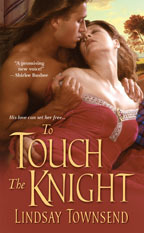 My latest Kensington medieval romance is now out and available for sale in shops and at ebook stores (UK paperback due in August).
To Touch the Knight
is set during the time of the Black Death, when almost a third of the people in Britain died due to the plague. It was a period of massive change and terror, but also, for the survivors, a chance for a better life. You can find more, including an excerpt and buy links, here.
My latest Kensington medieval romance is now out and available for sale in shops and at ebook stores (UK paperback due in August).
To Touch the Knight
is set during the time of the Black Death, when almost a third of the people in Britain died due to the plague. It was a period of massive change and terror, but also, for the survivors, a chance for a better life. You can find more, including an excerpt and buy links, here.
Published on July 01, 2011 00:00
June 14, 2011
'To Touch the Knight' at 'Heroes and Heartbreakers'
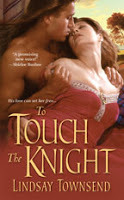 Not long now - To Touch the Knight comes out in early July, and there's a long excerpt up today at Heroes and Heartbreakers.
Not long now - To Touch the Knight comes out in early July, and there's a long excerpt up today at Heroes and Heartbreakers. And don't forget, A Knight's Enchantment
 still has a few days to run at $0.99c in the Amazon Kindle Sunshine Deals promotion!
still has a few days to run at $0.99c in the Amazon Kindle Sunshine Deals promotion!
Published on June 14, 2011 09:18
May 27, 2011
New review for 'A Knight's Enchantment'
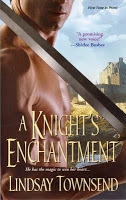 Vicky at Sizzling Hot Books has given an enthusiastic review to A Knight's Enchantment this week, including some appreciative comments about my historical setting and the use of alchemy.
Vicky at Sizzling Hot Books has given an enthusiastic review to A Knight's Enchantment this week, including some appreciative comments about my historical setting and the use of alchemy.Read it in full here.
Published on May 27, 2011 03:28
May 22, 2011
Sample Sunday - 'A Knight's Vow' : new excerpt
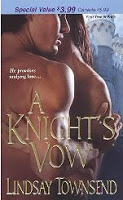 Here is an excerpt from the first of my medieval historical romances, A Knight's Vow. In it, the hero and heroine are growing closer together.
Here is an excerpt from the first of my medieval historical romances, A Knight's Vow. In it, the hero and heroine are growing closer together.Excerpt
She had filled out a little more in the last few days, lost that grayness under her eyes and in her face. In her new blue gown and with her hair streaming out behind her as they cantered over the downs, Alyson was more vivid than the fresh summer green of the trees, so bright to his eye after the muted, dusty colors of Outremer. She was more delicate than the scattered cowslips, speedwell and orchids that bordered the chalk track they were racing along, giving the horses their heads. She rode superbly - but then, what did Alyson not do superbly?
And she is mine. Guillelm wanted to utter a war-cry from sheer bravado, utter pride and joy. At the castle gate, one of his guards had asked if he was hunting today and he was, though not with hawk or dogs. His present quarry needed more subtlety, and patience. Patience above all, Guillelm reminded himself, thinking once more of Heloise of Outremer and her dreadful warning.
Desperate to avoid that fate with Alyson, he had planned this day as he might a military campaign and only prayed that his preparations would be to her liking. He knew the arts of war but less those of peace. How did an English lord entertain his lady?
He had taken food from the kitchen for them but now, as he spied a stand of oak trees where they might shelter from the midday heat and relax, he was unsure. As a girl, Alyson had enjoyed romping and eating out of doors but as a woman perhaps she would consider those things too unmannerly, even coarse.
'I thought we might stop here, allow the horses to graze.' Fool! It must be obvious that is only an excuse, he thought, scanning the sparse grass under the trees. 'If that is acceptable?' he went on, compounding his error by actually asking permission.
Alyson nodded and reined in. Swiftly dismounting, perhaps so that she did not have to endure his touch, she knelt by one of the oaks. As he wondered what she was doing, Guillelm watched her take a worn knife from her belt and begin sawing at the bracket fungus growing at the base of the trunk.
'This may be useful for my healing,' she explained, lifting the fungus onto a clean scrap of cloth she had produced from somewhere about her person.
'Healing is surely in God's hands,' Guillelm began, recalling old childhood tales of poisoned toadstools, but Alyson wrinkled her nose.
'It may be, but Christ gave us wit and nimble fingers to aid ourselves,' she said.
He knelt beside her and took her knife, plunging it into the grass.
That is a very round reply, mistress.' Would she be teased by him, Guillelm wondered. Dare he tease?
The matter was resolved when Alyson thrust her tongue out at him.
If you enjoyed this sample, please comment or re-tweet it.
Published on May 22, 2011 00:00
May 18, 2011
Castles wanted, preferably ruined
 This may be sentimental of me, but I'm a romantic and I rather like castles with a bit of wear on them. The well-kept ones like this one at Ludlow in Shropshire, have a rugged grandeur and give a lot more scope for a writer's research, but there's something about a ruin.
This may be sentimental of me, but I'm a romantic and I rather like castles with a bit of wear on them. The well-kept ones like this one at Ludlow in Shropshire, have a rugged grandeur and give a lot more scope for a writer's research, but there's something about a ruin. The one lurking behind me on my usual mugshot is a good case in point: Dunstanburgh has one of the best locations in the country - acres of green, little villages, wild Northumberland coast - but it wouldn't have the same charm for me if it was complete and shiny-new.
The one lurking behind me on my usual mugshot is a good case in point: Dunstanburgh has one of the best locations in the country - acres of green, little villages, wild Northumberland coast - but it wouldn't have the same charm for me if it was complete and shiny-new. 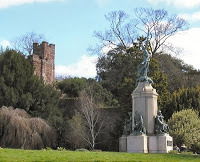 'Athelstan's Tower' at Exeter, where the Rougemont Castle site is a delectable public garden and the sandstone tower sits in the wall near the war memorial, is part of my husband's home-town memories.
'Athelstan's Tower' at Exeter, where the Rougemont Castle site is a delectable public garden and the sandstone tower sits in the wall near the war memorial, is part of my husband's home-town memories.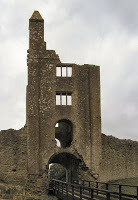 The battered gatehouse of the old castle at Sherborne in Dorset- the town has two, the second later and swankier - breathes long-vanished adventure to me, even (maybe especially) in a dull and rainy autumn afternoon.
The battered gatehouse of the old castle at Sherborne in Dorset- the town has two, the second later and swankier - breathes long-vanished adventure to me, even (maybe especially) in a dull and rainy autumn afternoon. Nonsense for a medievalist, I know, but indulge me.
Published on May 18, 2011 07:35
Castles wanted, preferably decrepit
 This may be sentimental of me, but I'm a romantic and I rather like castles with a bit of wear on them. The well-kept ones like this one at Ludlow in Shropshire, have a rugged grandeur and give a lot more scope for a writer's research, but there's something about a ruin.
This may be sentimental of me, but I'm a romantic and I rather like castles with a bit of wear on them. The well-kept ones like this one at Ludlow in Shropshire, have a rugged grandeur and give a lot more scope for a writer's research, but there's something about a ruin. The one lurking behind me on my usual mugshot is a good case in point: Dunstanburgh has one of the best locations in the country - acres of green, little villages, wild Northumberland coast - but it wouldn't have the same charm for me if it was complete and shiny-new.
The one lurking behind me on my usual mugshot is a good case in point: Dunstanburgh has one of the best locations in the country - acres of green, little villages, wild Northumberland coast - but it wouldn't have the same charm for me if it was complete and shiny-new.  'Athelstan's Tower' at Exeter, where the Rougemont Castle site is a delectable public garden and the sandstone tower sits in the wall near the war memorial, is part of my husband's home-town memories.
'Athelstan's Tower' at Exeter, where the Rougemont Castle site is a delectable public garden and the sandstone tower sits in the wall near the war memorial, is part of my husband's home-town memories. The battered gatehouse of the old castle at Sherborne in Dorset- the town has two, the second later and swankier - breathes long-vanished adventure to me, even (maybe especially) in a dull and rainy autumn afternoon. Nonsense for a medievalist, I know, but indulge me.
The battered gatehouse of the old castle at Sherborne in Dorset- the town has two, the second later and swankier - breathes long-vanished adventure to me, even (maybe especially) in a dull and rainy autumn afternoon. Nonsense for a medievalist, I know, but indulge me.
Published on May 18, 2011 07:35



